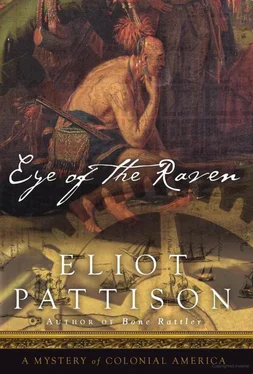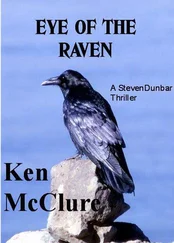Eliot Pattison - Eye of the Raven
Здесь есть возможность читать онлайн «Eliot Pattison - Eye of the Raven» весь текст электронной книги совершенно бесплатно (целиком полную версию без сокращений). В некоторых случаях можно слушать аудио, скачать через торрент в формате fb2 и присутствует краткое содержание. Год выпуска: 2010, ISBN: 2010, Издательство: Counterpoint Press, Жанр: Исторический детектив, на английском языке. Описание произведения, (предисловие) а так же отзывы посетителей доступны на портале библиотеки ЛибКат.
- Название:Eye of the Raven
- Автор:
- Издательство:Counterpoint Press
- Жанр:
- Год:2010
- ISBN:9781582437019
- Рейтинг книги:5 / 5. Голосов: 1
-
Избранное:Добавить в избранное
- Отзывы:
-
Ваша оценка:
- 100
- 1
- 2
- 3
- 4
- 5
Eye of the Raven: краткое содержание, описание и аннотация
Предлагаем к чтению аннотацию, описание, краткое содержание или предисловие (зависит от того, что написал сам автор книги «Eye of the Raven»). Если вы не нашли необходимую информацию о книге — напишите в комментариях, мы постараемся отыскать её.
Eye of the Raven — читать онлайн бесплатно полную книгу (весь текст) целиком
Ниже представлен текст книги, разбитый по страницам. Система сохранения места последней прочитанной страницы, позволяет с удобством читать онлайн бесплатно книгу «Eye of the Raven», без необходимости каждый раз заново искать на чём Вы остановились. Поставьте закладку, и сможете в любой момент перейти на страницу, на которой закончили чтение.
Интервал:
Закладка:
Eliot Pattison
Eye of the Raven
They were on the bloodiest ground of a bloody war, and neither side in the great global conflict was inclined to show mercy. With every step the old Indian took through the sleeping enemy camp, Duncan McCallum's heart rose higher in his throat. He had begged Conawago to stay away from the enemy bivouac, had promised he would come back with him on the next full moon, but his companion would not wait. It mattered little to him that the Hurons camped with the French below would roast him alive if they found him stalking through their camp. The spirits had placed their enemy there to test his resolve, Conawago had insisted, and he had begged the young Scot not to accompany him. He had not a moment to spare in his quest to save the tribes, and his mother had taught him that the sacred ochre he needed from the ledge by the camp was at its most powerful when harvested under the full moon.
Duncan watched in abject fear as Conawago slipped between the French officers' tents, then stepped past one sleeping form after another, his linen shirt lit like a beacon in the moonlight. As he leaned forward from the shadows Duncan saw that his friend's hand gripped not the war ax at his belt but the amulet that hung from his neck. A man with blond locks stirred near the smoldering fire as Conawago passed by. The long rifle in Duncan's hand flew to his shoulder, and he kept the figure in its sights until the French soldier settled back into his blanket.
The haunting call of a whippoorwill rose from the opposite side of the camp, where Duncan had last seen the Huron sentry. Suddenly a second bird answered, much nearer, sending Duncan back against a tree, every muscle tensed, every nerve on fire. He had not expected a second sentry, but now knew there was one, near the rock face that was Conawago's destination. Duncan bent low and with slow, stealthy strides eased through the mountain laurel. Not many months earlier he would have thrashed about like a lost cow in the undergrowth, would have been dead after his first few steps so close to the enemy. But after so many months with him in the wilderness Conawago had proclaimed he was no longer a Highland Scot, but a woodland Scot.
The tall, muscular Huron stood in the brush, watching not the camp but the forest, his back to Duncan, his head cocked as if he had sensed something in the deep shadows of the woods. Duncan's heart hammered in his chest as he silently lifted his tomahawk. If he did not disable the guard in one blow the alarm would be spread. But as Duncan raised his arm the sentry suddenly gasped in pain, clutching at his head, then was jerked violently downward, disappearing into the brush. Duncan heard a low moan then a faint rustling of leaves that could have been the sound of something scurrying away.
The sentry was unconscious when Duncan reached him. A dozen frantic thoughts raced through his mind, that one of the nocturnal predators of the forest was stalking them, that they had stumbled into a nest of poison vipers, that he and Conawago were about to be trapped in a battle between the Hurons and their blood foes the Iroquois. Then he saw his friend had reached the exposed ledge that held the ochre. He choked down his fears and rushed to help Conawago extract the sacred yellow powder.
But though he had reached the rock face, his companion was not digging the ochre. With two dozen bloodthirsty enemies before him he was on his knees, arms outstretched at his waist, palms upward, speaking softly to the moon.
"By all that's holy, dig it out!" Duncan whispered, watching the sleeping camp, desperately trying to calculate where the remaining sentry would be.
"All that's holy will tell me if I am worthy," Conawago replied slowly. His months-long quest to reconnect the tribes to their gods, who had so clearly abandoned them, might be the most urgent task of his life, but he would not rush the spirits.
He was waiting for a sign.
Duncan surveyed the camp in grim anticipation. Surely there was no chance now of escaping undetected. But he would not interfere with this courageous elder, who so uncannily reminded him of his beloved grandfather, who had indeed become like a grandfather, and more, to him. Duncan's tribe too had been abandoned by its gods, years earlier in the Highlands of Scotland, his tribe too was nearly extinct due to the greed of the European kings. He had been denied a chance to give his life for his clan in Scotland, but he would not hesitate to offer it up to protect the gentle old Nipmuc.
He freed his knife of the leather strap that kept it tight to his belt then knelt and rested his rifle barrel on a boulder facing the camp. The Huron raiders, always painted with blood, would come first, screaming like banshees, eager for the demons carved on their ax heads to chew enemy flesh.
He heard a whispered syllable of gratitude and looked up to see a solitary goose fly across the face of the moon. Conawago arranged a square of leather below the seam of ochre and began gouging it out with his knife.
They were trotting westward, along the ancient trail that connected the homelands of the Iroquois in the north to the western Ohio country, the first gray light of day filtering through the oaks and hemlocks, when Conawago abruptly slowed. Suddenly his long battle ax was in his hand, its end circling in the air as if about to be launched. Duncan raised his rifle, instinctively cocking the hammer. Conawago pushed the pouch that contained the hardwon ochre to his back to protect it, and he seemed about to charge forward when he spotted a pale oval object on the path in front of him.
Duncan had never known him to show defeat, but now as the old Indian gazed at the turtle shell painted with red symbols an anguished groan escaped his lips. He took a step backward and seemed to sag as a tall warrior stepped out of the shadows. The stranger was unarmed except for a hunting knife hanging from a strap across his bare chest, though the fire in his eyes said he was about to wreak havoc. Conawago dropped his ax to the ground and motioned Duncan to lower his gun, muttering one word, "Onondaga," the name of one of the friendly Six Nations, the Iroquois.
But the man gave no indication of being an ally. He tensed, his fists clenched, as if about to spring on the old man.
Duncan stepped to the side, ready to react when the stranger attacked. He saw now the turtle tattoo that covered half his face, the elaborate painted designs on his arms and chest, exposed under the sleeveless waistcoat he wore open over his buckskin leggings and loincloth. The stranger was no ordinary warrior but a leader of one of the tribes' powerful secret societies. Duncan searched his memory for what he had learned of the Onondaga in his months with Conawago. They were the keepers of the Iroquois Confederation's central hearth, arbiters of disputes, guardians of the ancient secrets that kept the tribes anchored to their past.
"Chief of the Turtle Clan," Conawago added, as if the announcement should quiet Duncan.
"You are outcast!" the intruder hissed. "Since the birth of our people our totems have been safe, honored by our prayers and protected by our gods. Then you steal them like a common thief? You spit on our gods! You are no longer protected by the Haudenosaunee!"
Duncan saw the grief that rose on his friend's face, like a physical pain contracting his features. His mind raced back a month earlier to a small cave above one of the long lakes west of the New York colony, its entrance surrounded by skulls and feathers. Over the opening had been a large turtle shell painted with symbols identical to those on the shell before them. Conawago had insisted Duncan wait outside while he entered the cave. The old Indian had spent the day before in purification rites at a mountain spring and most of the following night reciting prayers in the tongue of his fathers. But Duncan had seen the mote of doubt that had lingered in his eyes for days afterward, and the appearance of the clan chief now seemed to trigger the same emotion.
Читать дальшеИнтервал:
Закладка:
Похожие книги на «Eye of the Raven»
Представляем Вашему вниманию похожие книги на «Eye of the Raven» списком для выбора. Мы отобрали схожую по названию и смыслу литературу в надежде предоставить читателям больше вариантов отыскать новые, интересные, ещё непрочитанные произведения.
Обсуждение, отзывы о книге «Eye of the Raven» и просто собственные мнения читателей. Оставьте ваши комментарии, напишите, что Вы думаете о произведении, его смысле или главных героях. Укажите что конкретно понравилось, а что нет, и почему Вы так считаете.












